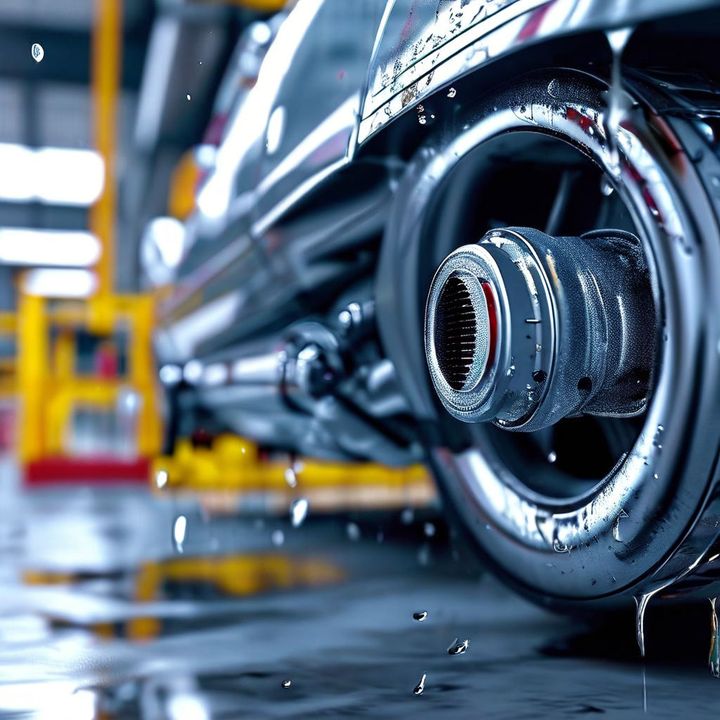


Getting water in your vehicle's exhaust system is a relatively common issue that can occur due to various reasons, such as driving through deep puddles, heavy rainfall, or even a malfunctioning exhaust system. While it may seem harmless, water in the exhaust can potentially lead to several problems and even damage your vehicle if left unaddressed.

Before we dive into the potential issues, let's start with the basics. Your vehicle's exhaust system is responsible for expelling the byproducts of the combustion process that occurs within the engine. One of these byproducts is water vapor, which is formed when the hydrogen in the fuel combines with oxygen during combustion.
As this hot water vapor travels through the exhaust system, it can cool down and condense into liquid water droplets. This is a perfectly normal phenomenon, especially when you first start your engine or during cold weather conditions. In fact, it's not uncommon to see a small amount of water dripping from the tailpipe after a cold start or a short trip.
While a little water dripping from the exhaust is generally harmless, there are situations where it can indicate a more serious underlying issue. Here are some scenarios where you should pay closer attention:
| Scenario | Potential Issue |
|---|---|
| Excessive water dripping, even after engine warmup | Possible internal engine problem |
| Colored or sweet-smelling water | Coolant leaking into combustion chambers |
| White smoke accompanying the water | Head gasket or piston ring issue |
Now that we've established when water in the exhaust might be a concern, let's explore some of the most common causes:
As mentioned earlier, a small amount of water dripping from the exhaust is often just condensation and is perfectly normal. This is especially true when you first start your engine or during cold weather conditions. As the engine warms up, the condensation should dissipate.
One of the more serious causes of water in the exhaust is a faulty head gasket. The head gasket is a crucial component that seals the cylinder head to the engine block, preventing coolant from leaking into the combustion chambers. If the head gasket fails, coolant can seep into the cylinders and get expelled through the exhaust as water or steam.
Similar to a faulty head gasket, worn or damaged pistons or piston rings can also allow coolant to enter the combustion chambers and exit through the exhaust as water or steam. This is an expensive repair that typically involves disassembling the engine to replace the affected components.
If your engine overheats, it can put excessive stress on the head gasket, potentially causing it to fail. This can lead to coolant leaking into the cylinders and being expelled through the exhaust as water or steam. Addressing overheating issues promptly is crucial to prevent further damage.
The catalytic converter is responsible for converting harmful exhaust gases into less harmful substances, including water vapor. If the catalytic converter is not functioning properly, it can cause excessive water vapor to condense and drip from the exhaust.
If you suspect that the water dripping from your exhaust is more than just normal condensation, it's essential to have a professional mechanic inspect and diagnose the issue. Here are some steps they might take:
Visual Inspection: The mechanic will visually inspect the water dripping from the exhaust to determine if it's clear or colored/has an odor. Clear water is likely just condensation, while colored or sweet-smelling water could indicate coolant leakage.
Engine Running Test: The mechanic may let your engine run for an extended period to see if the water dripping stops or continues. If it stops, it was likely just condensation. If it continues, there's a larger issue at play.
Oil Dipstick Check: The mechanic will check the oil dipstick for any signs of a milky substance, which could indicate coolant mixing with the engine oil – a telltale sign of a failed head gasket.
Smoke Inspection: The mechanic will observe the exhaust for any white smoke accompanying the water, which can signify a head gasket or piston ring issue.
Based on these inspections and diagnostic tests, the mechanic can pinpoint the root cause of the water in the exhaust and recommend the appropriate repairs.
The repairs required will depend on the underlying cause of the water in the exhaust. Here are some common repair scenarios:
If the issue is a faulty head gasket, the repair will involve replacing the head gasket. This is a labor-intensive process that requires disassembling the engine to access the gasket. Depending on the make and model of your vehicle, a head gasket replacement can cost anywhere from $1,000 to $2,000 or more for labor and parts.
In the case of worn or damaged pistons or piston rings, the repair will involve removing and replacing the affected components. This can be an expensive repair, typically costing between $1,500 and $3,000 or more for labor and parts, depending on the complexity of the job.
If the issue is related to an overheating engine, the repairs may involve addressing problems with the cooling system, such as replacing the water pump, thermostat, or other components. The cost of cooling system repairs can range from $500 to $1,500, depending on the specific components that need to be replaced.
| Repair | Estimated Cost Range |
|---|---|
| Head Gasket Replacement | $1,000 - $2,000+ |
| Piston/Ring Replacement | $1,500 - $3,000+ |
| Cooling System Repairs | $500 - $1,500 |
| Catalytic Converter Replacement | $500 - $2,000 |
If the catalytic converter is the culprit, it may need to be cleaned or replaced entirely. The cost of a catalytic converter replacement can range from $500 to $2,000, depending on the make and model of your vehicle.
While some issues are unavoidable, there are steps you can take to help prevent water from accumulating in your exhaust:

Follow recommended service schedules for coolant flushes and other maintenance to prevent issues like head gasket failures.
Address overheating promptly to prevent further damage and potential coolant leaks.
Avoid excessive idling and frequent short trips that don't allow the engine to fully warm up, as this can contribute to condensation buildup in the exhaust system.
While a small amount of water dripping from the exhaust may not seem like a big deal, ignoring the issue can lead to more significant and costly repairs down the line. Addressing the problem early can save you money and prevent further damage to your vehicle.
For example, if the water is caused by a faulty head gasket and left unaddressed, it can lead to coolant contamination in the engine oil, potentially causing catastrophic engine failure. In such cases, the cost of repairs can skyrocket, potentially requiring a complete engine rebuild or replacement, which can easily exceed $5,000 or more, depending on the vehicle.
Similarly, if the water is caused by worn pistons or piston rings and left unchecked, it can lead to further damage to the engine's internal components, increasing the repair costs significantly. In some cases, the cost of repairing or replacing the damaged components may even exceed the value of the vehicle itself, making it more economical to consider a replacement vehicle.
In conclusion, while a small amount of water dripping from the exhaust is generally harmless and can be attributed to normal condensation, excessive water or water accompanied by other symptoms can indicate a more serious underlying issue. As a mechanic, I always recommend having any unusual exhaust behavior inspected by a professional to ensure timely diagnosis and repair.
By addressing issues promptly and following recommended maintenance schedules, you can help prevent costly repairs and extend the lifespan of your vehicle. Remember, a little water in the exhaust may not seem like a big deal, but ignoring it could lead to a much bigger problem down the road, potentially costing you thousands of dollars in repairs or even the need for a new vehicle.
The main cause is condensation of water vapor produced during the combustion process. As hot exhaust gases cool down in the exhaust system, the water vapor condenses into liquid droplets.
Yes, a small amount of water dripping from the exhaust, especially when the engine is cold, is generally considered normal and not a cause for concern.
Excessive water dripping even after the engine has warmed up, colored or sweet-smelling water, and white smoke accompanying the water can indicate a more serious underlying problem.
Common causes include a faulty head gasket, worn pistons or piston rings, an overheating engine, and catalytic converter issues.
A mechanic will perform a visual inspection, engine running test, oil dipstick check, and smoke inspection to diagnose a potential head gasket failure.
Head gasket replacement can cost $1,000 to $2,000+, piston/ring replacement can cost $1,500 to $3,000+, cooling system repairs can cost $500 to $1,500, and catalytic converter replacement can cost $500 to $2,000.
Ignoring the issue can lead to more significant and costly repairs down the line, such as engine failure or the need for a complete engine rebuild or replacement.
Following recommended service schedules, addressing overheating issues promptly, and avoiding excessive idling and short trips can help prevent water accumulation in the exhaust system.
Yes, rust can cause bumps, holes, and cracks in the exhaust system components, leading to leaks and compromised functionality.
Other common issues include loose components, blockages, and wear and tear of parts like the exhaust manifold and oxygen sensors.

Sarah isn't your average gearhead. With a double major in Mechanical Engineering and Automotive Technology, she dived straight into the world of car repair. After 15 years of turning wrenches at dealerships and independent shops, Sarah joined MICDOT to share her expertise and passion for making cars run like new. Her in-depth knowledge and knack for explaining complex issues in simple terms make her a valuable asset to our team.












